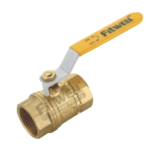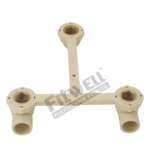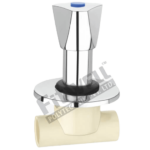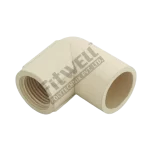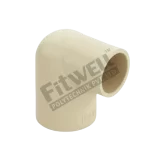Why CPVC Pipes are Preferred for Potable Water?
What Features Make CPVC Pipes Ideal for Drinking Water Systems?
CPVC pipes are preferred for potable water due to their durability, chemical resistance, and ability to handle a wide range of temperatures. Their smooth internal surface reduces friction, ensuring efficient water flow and minimizing energy use in pumping systems. These features make CPVC a reliable and long-lasting solution for potable water systems.
How Does CPVC Resist Corrosion Compared to Other Materials?
CPVC is inherently resistant to corrosion caused by water, chemicals, and environmental factors. Unlike metal pipes that rust or corrode when exposed to water or certain chemicals, CPVC maintains its structural integrity, even in harsh conditions. This property extends the lifespan of CPVC systems and ensures water quality remains unaffected.
How Do CPVC Pipes Improve the Safety of Potable Water?
CPVC pipes improve potable water safety by preventing the leaching of harmful substances into the water. They are non-reactive and designed to maintain the purity of drinking water, even when exposed to high temperatures or disinfectants like chlorine.
Does CPVC Prevent Chemical Leaching into Water?
Yes, CPVC pipes are engineered to prevent the leaching of harmful chemicals into the water supply. Unlike some materials, CPVC does not degrade or release contaminants under normal use, ensuring the safety of the water.
Why Is CPVC Used for Drinking Water?
CPVC is widely used for drinking water systems because it meets safety standards, resists high temperatures, and does not affect the taste or smell of the water. Its non-toxic and non-corrosive nature makes it a preferred choice for potable water systems worldwide.
Is CPVC Better at Withstanding High Temperatures Than PVC?
Yes, CPVC outperforms standard PVC in terms of thermal resistance. While PVC softens and deforms at high temperatures, CPVC can handle hot water up to 200°F (93°C) without losing its strength or integrity.
What Makes CPVC Suitable for Carrying Potable Water?
CPVC is suitable for potable water systems due to its hygienic properties, resistance to biofilm formation, and compliance with health and safety standards. Its inert nature ensures that it does not alter the composition of the water it carries.
Does CPVC Maintain Water Quality Over Time?
Yes, CPVC maintains water quality by preventing the buildup of sediments, scaling, and bacterial growth. Its smooth interior surface allows water to flow freely while reducing the risk of contamination.
Are There Specific Properties of CPVC That Benefit Drinking Water Systems?
CPVC’s unique properties, such as its smooth surface, high-temperature resistance, and low thermal conductivity, directly benefit drinking water systems by improving efficiency and safety.
How Does CPVC’s Smooth Surface Reduce Bacterial Growth?
The smooth inner walls of CPVC pipes discourage bacterial growth and biofilm formation, a common problem in other piping materials. This helps maintain a hygienic water supply and reduces the need for frequent cleaning.
Is CPVC Rated for Potable Water?
Yes, CPVC is rated for potable water use and meets stringent certifications and standards to ensure it is safe for drinking water applications.
What Certifications Ensure CPVC Is Safe for Drinking Water?
Certifications like NSF/ANSI 61 confirm that CPVC is safe for use in potable water systems. These standards evaluate the material for potential leaching, toxicity, and overall safety in carrying drinking water.
Does CPVC Meet Safety Standards for Drinking Water Use?
CPVC complies with global safety standards for potable water systems. These include approvals from organizations like the Environmental Protection Agency (EPA) and other regulatory bodies.
What Are the Regulatory Requirements for CPVC in Potable Water Systems?
Regulations for CPVC require it to meet specific safety criteria, including chemical resistance, durability, and non-toxicity. Manufacturers must demonstrate compliance with these standards through rigorous testing.
Are All CPVC Pipes Approved for Potable Water Applications?
Not all CPVC pipes are approved for potable water. Some are designed for industrial use and may lack the necessary certifications for drinking water.
How Can You Identify CPVC Pipes Certified for Potable Water?
Look for markings such as “NSF 61” or similar certifications on the pipes. These labels confirm that the product meets safety standards for carrying potable water.
What Is the Best Pipe for Potable Water?
The best pipe for potable water depends on specific needs such as temperature resistance, cost, and longevity. CPVC is often considered one of the top choices for its balance of safety, durability, and affordability.
Which Factors Determine the Best Pipe Material for Potable Water?
Key factors include thermal resistance, chemical inertness, ease of installation, and long-term performance. CPVC ticks all these boxes, making it a strong contender.
Which Piping Material Offers the Safest Solution for Potable Water?
CPVC is one of the safest options for potable water, but materials like copper and PEX also provide reliable alternatives depending on the application.
How Do Metal Pipes Compare to CPVC in Terms of Safety?
Metal pipes, such as copper, may leach trace amounts of metals into the water over time. CPVC avoids this issue entirely, offering a non-metallic solution that ensures water purity.
Why Can’t PVC Be Used for Potable Water?
PVC lacks the safety and thermal properties required for potable water systems. It can release harmful chemicals when exposed to heat or sunlight, making it unsuitable for drinking water.
Does PVC Release Harmful Chemicals Into Water?
Yes, standard PVC can leach harmful chemicals, especially when exposed to high temperatures, compromising the safety of the water supply.
Why Is CPVC Not Used Anymore?
In some cases, CPVC is being phased out due to environmental concerns, cost, or the availability of newer materials like PEX that offer greater flexibility and durability.
Are There Environmental Concerns About Using CPVC?
The production of CPVC involves chlorine, which raises environmental concerns during manufacturing and disposal. This has led some regions to explore alternatives.
Manufacturing Process of CPVC Piping Systems
Conclusion
CPVC pipes have long been a preferred choice for potable water systems due to their durability, safety, and resistance to corrosion and high temperatures. They offer a balance of affordability, reliability, and performance, making them suitable for both residential and industrial applications.
However, like any material, CPVC has its limitations. While it excels in maintaining water purity and resisting chemical corrosion, it may not be ideal for outdoor use without proper protection and could become brittle under extreme conditions. Additionally, environmental concerns surrounding its production are leading to the exploration of alternative materials like PEX.
Frequently asked questions
Here are answers to some frequently asked questions about Fitwell's plumbing services.
Yes, CPVC pipes are specifically designed to be safe for drinking water. They meet stringent certifications like NSF/ANSI 61 and resist leaching harmful chemicals into the water.
CPVC is more chemically stable and can withstand higher temperatures compared to PVC, making it ideal for both hot and cold water applications. PVC, on the other hand, is not recommended for potable water due to potential leaching and degradation issues.
CPVC pipes typically last 50 years or more under normal conditions, making them a long-term, cost-effective choice for potable water.
While CPVC pipes can technically be used outdoors, they are sensitive to UV light, which can cause degradation. If used outdoors, they must be properly insulated or coated to protect against UV exposure.
CPVC is being replaced in some areas due to environmental concerns during manufacturing, potential brittleness under certain conditions, and the rise of alternative materials like PEX, which offer greater flexibility.
Stay on the forefront of industry trends by checking out our latest content
Stay ahead with our latest content, designed to keep you informed on the newest industry trends and insights. Discover valuable updates that help you lead in your field.

Trusted uPVC Pipes Manufacturers for India’s Top Contractors
Introduction: The Surge in Demand for uPVC Pipes Among Top Contractors in India The construction and infrastructure sectors in India have witnessed a significant transition toward sustainable and long-lasting materials.
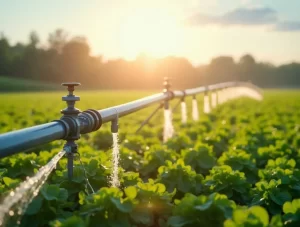
Top Innovations in Agricultural Pipe Fittings for Water Savings [2025]
Introduction to Agricultural Pipe Fittings and Water Sustainability Agricultural pipe fittings play a pivotal role in building efficient irrigation systems, crucial for modern farming practices. By exploring the versatility of

Expeart Tips from MDPE Pipe Fittings Manufacturers to Avoid Failures
Expeart Tips from MDPE Pipe Fittings Manufacturers to Avoid Failures Understanding MDPE Pipe Fittings: An Overview MDPE (Medium Density Polyethylene) fittings, used extensively in gas and water systems, offer strong,
Request a Free Consultation
Get personalized plumbing solutions with a free consultation from Fitwell.

